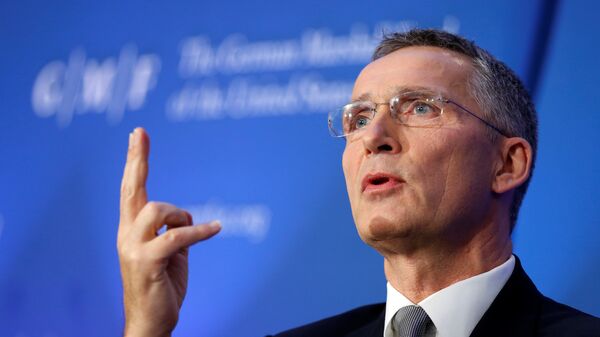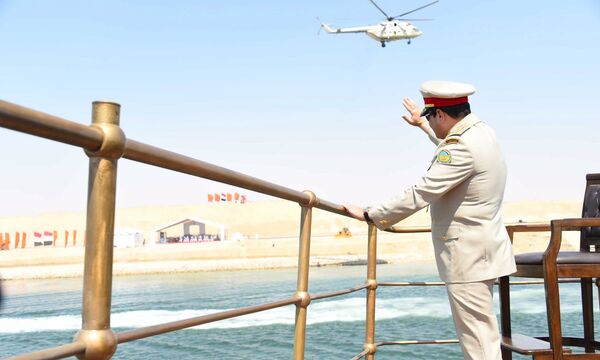The anniversary is significant in that NATO faced massive new challenges 60 years ago and moved to develop from just a military alliance to work together on non-military objectives, including economic, scientific and technical and cultural cooperation.
In December 1956, transatlantic relations — and those within Europe — were in a state of uncertainty in the wake of the Suez crisis. Israel, the UK and France had invaded Egypt to protect the Suez Canal, only to be countermanded by the US, Russia and the United Nations. Tempers were high.
The so-called 'Three Wise Men' — Lester B. Pearson, Foreign Minister of Canada, Gaetano Martino, Foreign Minister of Italy, and Halvard Lange, Foreign Minister of Norway — were tasked with finding new areas where cooperation in dispute resolution was needed and suggesting ways such cooperation could foment within the Atlantic Community.
Fundamentally, they came up with NATO as not simply a military alliance, but a non-military cooperative, which embraced political, economic and cultural cooperation. Some say it sowed the seeds for what is now the European Union, at whose table the United States is an 'invisible' participant.
EU Defense Fund
Sixty years on, Stoltenberg — speaking in Brussels, December 13 - reiterated those goals, saying: "Alliance unity is the backbone of our collective defense and deterrence. [The three wise men] also saw that greater unity could only come about through increased political consultation.
#NATO SG @jensstoltenberg commemorates 60th anniversary of #NATO3WiseMen Report https://t.co/TqbDomgJgX pic.twitter.com/CuoWgepGbg
— Oana Lungescu (@NATOpress) December 13, 2016
"We are all grateful that the Three Wise Men put forward a blueprint for more consultation to achieve greater unity. By recognizing the importance of non-military cooperation. By building on the core values that unite members of the Alliance. And by pointing the way toward creating a true Atlantic community," he told the Carnegie Europe event in Norway House, Brussels.
“Consultation leads to more listening & learning… This strengthens #NATO unity & cohesion” – SG @jensstoltenberg at #NATO3WiseMen pic.twitter.com/JDLCiWKmBV
— Tacan ILDEM (@NATOildemT) 13 December 2016
His words are significant at a time when the European Union is calling for its own security and defense capability — which some see as a threat to NATO's role within the European defense scenario. Why should Brussels replicate what is already there?
#EUDefence —More cooperation between Member States and greater pooling of national resources. Europe needs to take care of its own security. pic.twitter.com/0ZW8VYSuDp
— European Commission (@EU_Commission) 30 November 2016
The European Commission announced, November 30, the creation of a new European Defense Fund which would "support Member States' more efficient spending in joint defense capabilities," including research into "innovative defense technologies such as electronics, metamaterials, encrypted software or robotics" and the procurement of new assets, such as drone technology and jointly-bought helicopters to reduce costs.
The announcement came on the back of the last EU foreign ministers' meeting, November 14/15, which agreed to set up a rapid reaction force that will involve EU Battlegroups, "air security operations", "maritime security or surveillance operations", with its own headquarters, working alongside NATO.
Complementary Defense Capabilities
When questioned, December 6, by reporters about NATO-EU relations, Stoltenberg said: "We welcome stronger European defense, but [we need] to make sure that this is done in a way that is complementary to NATO."
In his 'Wise Men' speech, December 13, Stoltenberg was keen to stress the nature of a military and non-military alliance that was "transatlantic" — as the men had said 60 years ago — and not Brussels-centric.
.@jensstoltenberg: NATO and the EU have different capabilities and we need to make sure we work together #NATO3WiseMen
— Carnegie Europe (@Carnegie_Europe) 13 December 2016
"We are undertaking the biggest strengthening of our collective defense since the Cold War. These are political decisions, reached by consensus, by NATO political leadership. In close consultation with our military commanders.," Stoltenberg said.
"Thanks to the insights and recommendations of the Three Wise Men, NATO became a more adaptive political organization. The essence of the Committee's wisdom boils down to this: Non-military cooperation can be as important for the security of a nation or an alliance as the building of a battleship or the equipping of an army…
"… to keep this unique political and military Alliance between Europe and North America strong, flexible and united. So we can preserve peace and security for our nations for the next decades," he said, once again stressing the importance of "NATO political leadership", further emphasizing the transatlantic — and not just pan-EU — nature of the alliance.



